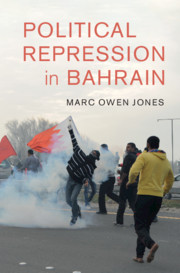Book contents
- Political Repression in Bahrain
- Cambridge Middle East Studies
- Political Repression in Bahrain
- Copyright page
- Dedication
- Contents
- Figures
- Tables
- Acknowledgements
- Abbreviations
- Introduction
- 1 Defining Political Repression
- 2 The Repression Playbook
- 3 Political Statecraft
- 4 Torture, Arrests and Other Personal Integrity Violations
- 5 Repressive Law and Legal Repression
- 6 Information Controls
- Conclusion
- Bibliography
- Index
- Series page
3 - Political Statecraft
Between Democratization, Discord and Division
Published online by Cambridge University Press: 07 July 2020
- Political Repression in Bahrain
- Cambridge Middle East Studies
- Political Repression in Bahrain
- Copyright page
- Dedication
- Contents
- Figures
- Tables
- Acknowledgements
- Abbreviations
- Introduction
- 1 Defining Political Repression
- 2 The Repression Playbook
- 3 Political Statecraft
- 4 Torture, Arrests and Other Personal Integrity Violations
- 5 Repressive Law and Legal Repression
- 6 Information Controls
- Conclusion
- Bibliography
- Index
- Series page
Summary
Chapter three details methods of statecraft in Bahrain across the Twentieth and Twenty First Century. In particular, the chapter notes several compelling trends. Firstly, the British desire to sail a Middle Course in Bahrain led to reforms designed to ameliorate dissent through indirect and pacific means, yet it also ultimately led to the crystallisation of the Al Khalifa regime. These methods included the civil list, municipal reform, and even the acknowledgement of primogeniture. It also notes that in the 1950s, growing Arab nationalism and a desire to sail this middle course of non-interference meant Britain innovated and improvised techniques of statecraft in order to repress the Higher Executive Committee.Post-Independence diminishing British influence and increasing Saudi ascendency meant that the government eschewed tactics like public-delegation through parliament in favour of methods centred around patronage. This Saudi largesse had the simultaneous effect of binding Bahrain closer to Saudi, resulting in long-term de-democratisation and rentierism. Diminishing British influence upon Independence also seemed to cause a manifestation of both Saudi and Al Khalifa animosity towards political opposition and the Shiʿa.
Keywords
- Type
- Chapter
- Information
- Political Repression in Bahrain , pp. 54 - 134Publisher: Cambridge University PressPrint publication year: 2020



